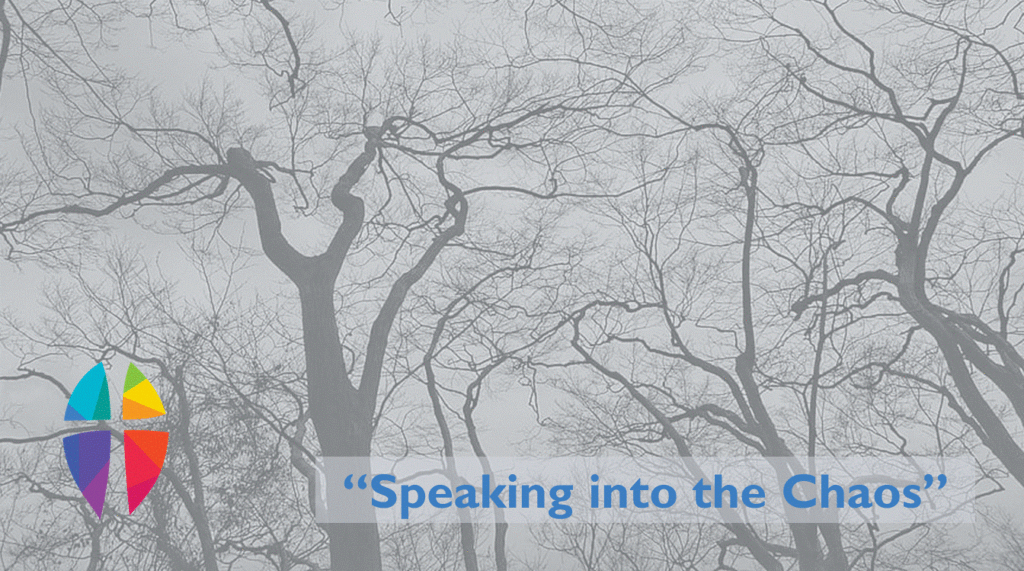REV. DR. ELIZABETH CUNNINGHAM
Stouffville United Church
Genesis 9:8-17
Lent 1

Noah knew something about what chaos was. God plunked him into the middle of it, albeit afloat on an ark filled with animals and his family. The waters from the heavens poured for forty days and forty nights, covering the earth. And it took 150 days before the waters began to recede, and longer until the ark rested once again on solid ground. God then spoke to Noah and offered him, his family, and all generations since then this covenant which serves God as a memo to self, as the proverbial string tied around one’s finger, that never again, never again, would God be the one to annihilate all life, as God did with the flood, to erase all the evil that humanity had been up to.
God is familiar with chaos. The bible begins with these words, “In the beginning, the earth was a formless void and darkness covered the face of the deep, while a wind from God swept over the waters.” And God brought definition to the formless void, in the separation of the water from the sky, and then the dry land and the seas, and the sun and the moon, giving us day and night.
And in this story of Noah and the flood, God brings order to the chaos, by ending the rain. And God places the sign of the rainbow to signal in a new covenant with God’s people that never again will God allow chaos to reign and destroy all living things. But what is more important than ensuring a creation that will not be interrupted by divine intervention, is that God will remember. God will remember God’s people. God will not forget us, which is important because the fear of being forgotten is part of the human psyche.
I remember as a child, lying in my little bed in the place my family travelled to every summer, to Daytona Beach in Florida. Being the only Canadians in the little community, we had the same friends that we met every summer. Who were also vacationing there during those weeks. This particular night, my little friends had organized a beach bonfire, supervised by parents. And I hadn’t been invited. They had forgotten about me. And I laid in my bed sinking in this weight of being forgotten. When a knock came to the door, and then my mother came in the room saying, “Get up, Elizabeth, your friends are here for you.” I was not forgotten. My joy was immense!
God says to Noah, “Whenever my bow appears in the clouds, I will see it, and remember the everlasting covenant between God and every living creature on the earth.” God will never forget. And yet we struggle to remember this. We feel God has forgotten us. The psalms are filled with the human voice crying out, My God, where are you? Have you forgotten me? Jesus on the cross cried out, My God, my God, why have you forsaken me?
It is this human cry in the midst of the chaos that is very much a part of our lived experience. It is very much a part of the biblical story, from the Israelites crying out when enslaved by Egypt, when the Israelites were taken in captivity to Babylon. Where is our God? Yet Theologian Paul Tillich reminds us, “Is there anything that can keep us from being forgotten … we cannot be forgotten because we are known eternally, beyond past and future.”[1]
In the breaking of the bread, in the pouring of the cup, it is about Jesus. And because it is about Jesus, it is about us. In the sharing of this bread and this cup, Jesus tells us, that in the chaos or the calm, I am with you, always. I will never forsake you.
The rainbow is the sign of God’s covenant to never forget us. Jesus also gave us a covenant, the New Covenant, which we mark in the words and the actions of Holy Communion, which we will celebrate together in a few moments. When he gathered with his disciples in the Upper Room, on the night before he died, he shared these words that have become our words, as we participate in a covenant to remember. Jesus took bread, and after giving thanks to God, he broke it and gave it to those who sat with him, saying: “Take, eat. This is my body, given for you. Do this in remembrance of me.” In the same way he took the cup, saying: “This cup is the new covenant sealed in my blood, shed for you for the forgiveness of sins. Whenever you drink it, do this in remembrance of me.”
In the breaking of the bread, in the pouring of the cup, it is about Jesus. And because it is about Jesus, it is about us. In the sharing of this bread and this cup, Jesus tells us, that in the chaos or the calm, I am with you, always. I will never forsake you.
“How firm a foundation, you servants of God, is laid for your faith in God’s excellent word! That soul, though all hell should endeavour to shake, I’ll never – no, never –no, never forsake!”[2]
Thanks be to God. Amen.
[1] Paul Tillich, The Eternal Now (New York: Charles Scribner’s Sons, 1963), 34.
[2] How Firm a Foundation, vs. 1 and 4, Voices United 660.
